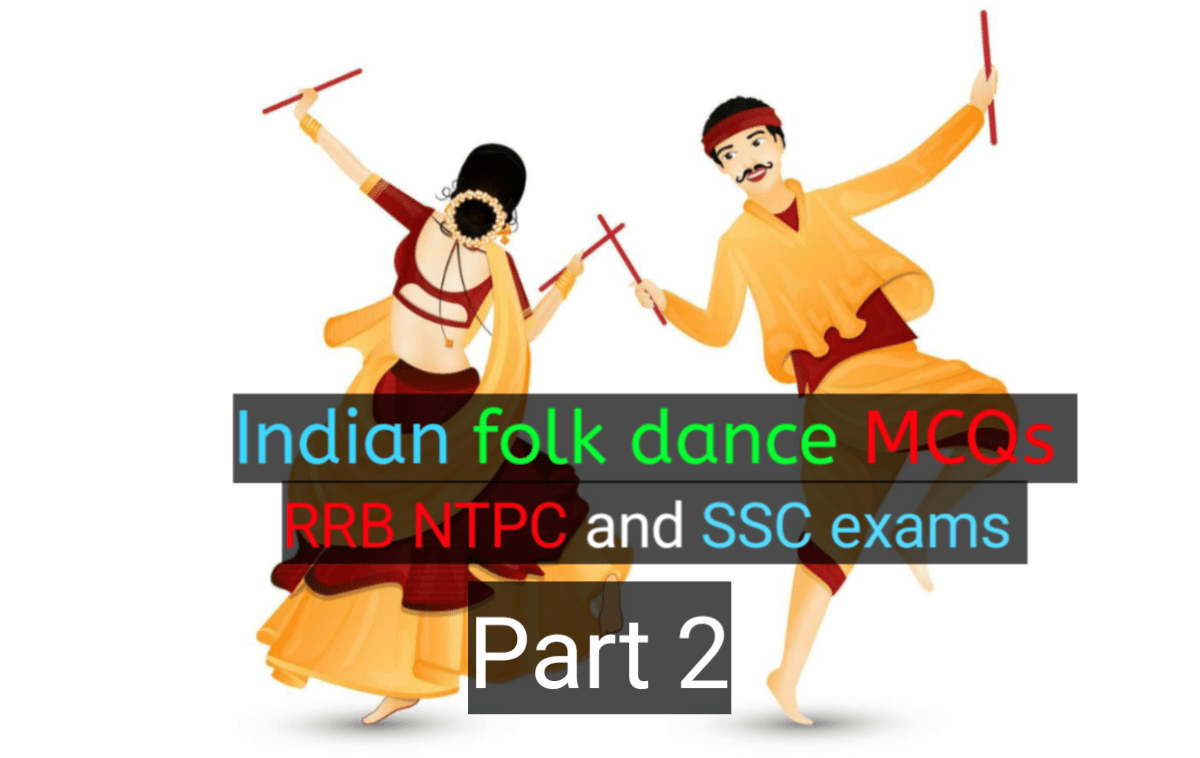This is the continuation of previous article which has 10 questions from Folk dance MCQs for RRB NTPC. You must read the previous questions accordingly.
Folk dance MCQs for RRB NTPC:
B. Yakshagana
C. Dhimsa
D. Puli Kali
Answer: D. Puli Kali
Explanation: Puli Kali, meaning “tiger dance,” is a folk art from Andhra Pradesh and Kerala in which dancers paint themselves as tigers and imitate the movements of the animal. This dance is performed during festivals and highlights the unique expressions and spirit of rural communities.
A. Mythological stories
B. Snakes and snake charmers
C. Harvest celebrations
D. Worship of deities
Answer: B. Snakes and snake charmers
Explanation: Kalbelia is a traditional folk dance performed by the Kalbelia community in Rajasthan. The dance reflects the graceful movements of snakes, with the performers dressed in black costumes adorned with intricate patterns, celebrating the community’s cultural heritage and traditional practices.
A. Odisha
B. Assam
C. Telangana
D. Gujarat
Answer: A. Odisha
Explanation: Dhimsa is a tribal dance from Odisha. The dance, marked by circular formations and rhythmic movements, is performed on auspicious occasions, such as weddings and festivals, symbolizing unity and joy among the community members.
Questions 14 to 16
A. Bihu
B. Jhumur
C. Sattriya
D. Chhau
Answer: B. Jhumur
Explanation: Jhumur is a folk dance performed by the tea garden workers of Assam. Known for its simple yet graceful movements, Jhumur reflects the joy and resilience of the tea garden community, celebrating their cultural heritage and unity in the lush tea estates of Assam.
A. Thullal
B. Kathakali
C. Kaikottikali
D. Theyyam
Answer: C. Kaikottikali
Explanation: Kaikottikali, or Thiruvathira Kali, is a traditional dance performed by women during Onam in Kerala. The dancers form a circle and perform graceful, synchronized steps to celebrate the festival. The dance represents prosperity and the spirit of the harvest season.
A. Karakattam
B. Silambattam
C. Oyilattam
D. Kummi
Answer: B. Silambattam
Explanation: Silambattam is a folk dance from Tamil Nadu, rooted in ancient martial art traditions. Dancers use bamboo sticks and showcase agile movements that highlight their combat skills, reflecting the valor and strength of Tamil Nadu’s traditional warriors.
Questions 17 to 19
A. Dhol
B. Mridangam
C. Flute
D. Thavil
Answer: D. Thavil
Explanation: Garadi is a folk dance performed in Puducherry, where the dancers wear elaborate costumes and hold sticks. The thavil, a traditional drum, provides the rhythm, adding energy to the performance and enhancing the celebratory mood of the dance.
A. Chhau
B. Kathi
C. Baul
D. Jatra
Answer: B. Kathi
Explanation: The Kathi dance is a folk dance from Bengal, symbolizing the joy of the harvesting season. The dance involves rhythmic steps and the use of small sticks, embodying the agrarian culture of Bengal and celebrating the prosperity brought by a successful harvest.
A. Haryana
B. Bihar
C. Uttar Pradesh
D. Punjab
Answer: A. Haryana
Explanation: Phag is a vibrant folk dance performed in Haryana during the festival of Holi. This dance, marked by energetic movements and lively music, symbolizes the arrival of spring and is a joyful way for the community to come together and celebrate the season.
Question 20
A. Garba
B. Dandiya Raas
C. Bhavai
D. Tippani
Answer: B. Dandiya Raas
Explanation: Dandiya Raas is a folk dance of Gujarat performed during Navratri. The dancers use sticks, symbolizing swords, to depict the mythical battle between Durga and Mahishasura, celebrating the triumph of good over evil and invoking the goddess’s protective energy.
The remaining questions will be available on next article. You can read the previous questions by Clicking Here.
To read MCQs from various subjects visit our website Master your gk .
You can visit Testbook.com for online classes and cources.

